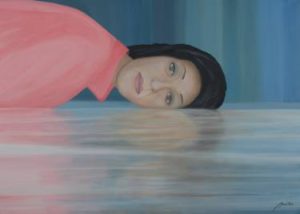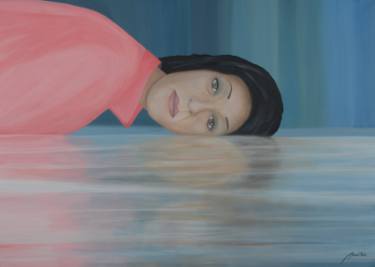 I remember the moment I felt blessedly ordinary. It was such a relief. In that moment I realized that I’d been carrying around an unconscious assumption that I was just slightly above others, floating just above the messy world. But when my deep, unobstructed breathing kicked in, I thought to myself, “I’m just an ordinary person, who has ordinary needs.” Like the need to be touched, to touch, to connect, to ask for help, to be comforted, to be fed what I want, when I want it. You can tell from my description that this “ordinary” voice emanated from a very early time in my life.
I remember the moment I felt blessedly ordinary. It was such a relief. In that moment I realized that I’d been carrying around an unconscious assumption that I was just slightly above others, floating just above the messy world. But when my deep, unobstructed breathing kicked in, I thought to myself, “I’m just an ordinary person, who has ordinary needs.” Like the need to be touched, to touch, to connect, to ask for help, to be comforted, to be fed what I want, when I want it. You can tell from my description that this “ordinary” voice emanated from a very early time in my life.
I’ve had intimations of ordinariness before in my life. But these were typically associated with judgment of my human needs and wants. I once wrote a song, one of the lines of which was: “The Golden Boy is falling fast, I’m one part wheat and two parts chaff.” The Golden Boy, a golden god-like statue sits atop the Parliament Building in Winnipeg, where I grew up. Notice the self-disparagement implicit in this verse. If I’m not the “Golden Boy”, the exceptional example of the human species, I’m chaff who deserves to be thrown in the fire. This is what happens to a person when he is propping themselves up with a false self. Either you’re a god or a wretch. But where’s Waldo? Where’s the real Bruce in all of this?
All my life, I’ve lived with this feeling that I was somehow special. This was corroborated by being an exceptional athlete throughout school and university. On top of that, I was considered “good looking” according to contemporary standards of such things, and popular with the cheerleaders. This was reinforced by a tendency in me to champion the underdogs at school, the freaks, the ones everybody else picked on.
Religion and new age spirituality reinforce this anti-gravitational view of self. Liberal Christianity, in particular, misses no opportunity to affirm and celebrate our uniqueness and our exceptional power and brilliance—all made in the image and likeness of God or Goddess. I get it. It’s a backlash against fundamentalist Christianity’s obsession with sin. But too often, this elevation of human beings to god-like status just reinforces the false expression of self.
What I didn’t realize was that my sense of being special had nothing to do with being an all-star athlete or the fact that girls seemed to be attracted to me, or my tendency to rescue the victim. My feeling of specialness was related to not needing or wanting anything for myself. Which is just weird. I learned that I was special because I got very good at not overwhelming my mother with all those demands that my other siblings seemed to pester her with. This is what it meant to be a “good” boy. I learned that the way to avoid being shamed or beaten was to become Mommy’s Little Hero. This was my persona that I shaped from a very early age, after being forced to completely surrender, in my defenceless and helpless condition.
Eventually, the suspension of my needs and wants toward a single “other” extended to a world of “others”, and I became a “self-reliant”, self-mothering, self-soothing, self-sufficient individual. In time, the suspension of my needs and wants morphed into complete dissociation from them. I just didn’t know what I wanted or needed in any given moment. Which reinforced to others my specialness. They might be out of control with stuff they couldn’t give themselves, but not me. I was an island of self-sufficiency. It goes without saying that the underlying feelings of rage, shame, and unspeakable sadness were also repressed, for decades, beneath this facade of the Hero. Heroes don’t act like that.
I remember when my first marriage was breaking up going to a marriage therapist. He put the question to both myself and my former wife. “What do you need from each other? List 10 things.” My former wife went first. No problem. She breezed right through her list. I listened with a growing sense of dread. I knew what would happen when the attention turned to me. I could not think of a single thing that I needed from her. The possibility that I had needs/wants raised my anxiety to intolerable levels. I associated them with being devastated. Along with the surfacing of my needs and wants came all the underlying vulnerability, the rage, the shame, and the sorrow. I kept them at bay for most of my life.
In her groundbreaking book, Prisoners of Childhood, the Drama of the Gifted Child and the Search for the True Self, Swiss psychoanalyst, Alice Miller, reveals how sensitive, alert children who are often recognized as “gifted” became so in order to attend to their parents needs, for the sake of survival. The child picks up intuitively that s/he is a repository for all the unmet needs and wants, and heartbreak of his/her parent, and instinctually begins to parent the parent. S/he becomes a “prisoner”, locked in this cell of childhood anxiety (because a child cannot parent a parent, but must in order to survive) for a lifetime.
In the process, the gifted one represses their strongest feelings (rage, hatred, sorrow) having learned that they are unacceptable to the parents. To express them is to risk annihilation. This might seem a little dramatic, but to a helpless dependent child, the giant raising his or her hand in anger, or withholding love, is an actual threat to survival. In response, the frightened child develops a false self, which s/he may carry for the rest of his or her days—along with depression, which is characterized by the lack of self-expression combined with the presence of historical oppression.
From the 13th century, the word “special” meant “better than ordinary, from the Old French, especial, “particular, unusual.”
Now I know that I’m just Bruce, who needs to love and be loved, to touch and be touched, to be cared for and to care. I’m not exceptionally compassionate. But I do care. I don’t have special healing powers. But I’ll listen to the voice of my own vulnerability and yours. I’m not all-knowing. But I’m as curious as the next guy. I can’t do everything well. But I can do some things well. I’m not an actor in anybody else’s drama. But I am free to write my own. Not everybody likes me. But so what? There are people I don’t want to be around either. I’m not responsible for anybody else’s misery. But if you let me know how I can make your life more beautiful, I’ll do what I can. Not because I don’t want to disappoint you, but because it feels good most of the time to do so. I’m not a nice guy. But neither am I a monster. I believe that I have something unique to contribute to this world. But I’ll offer it, not because I’m special, but just because I’m Bruce.

